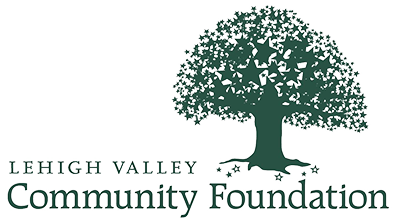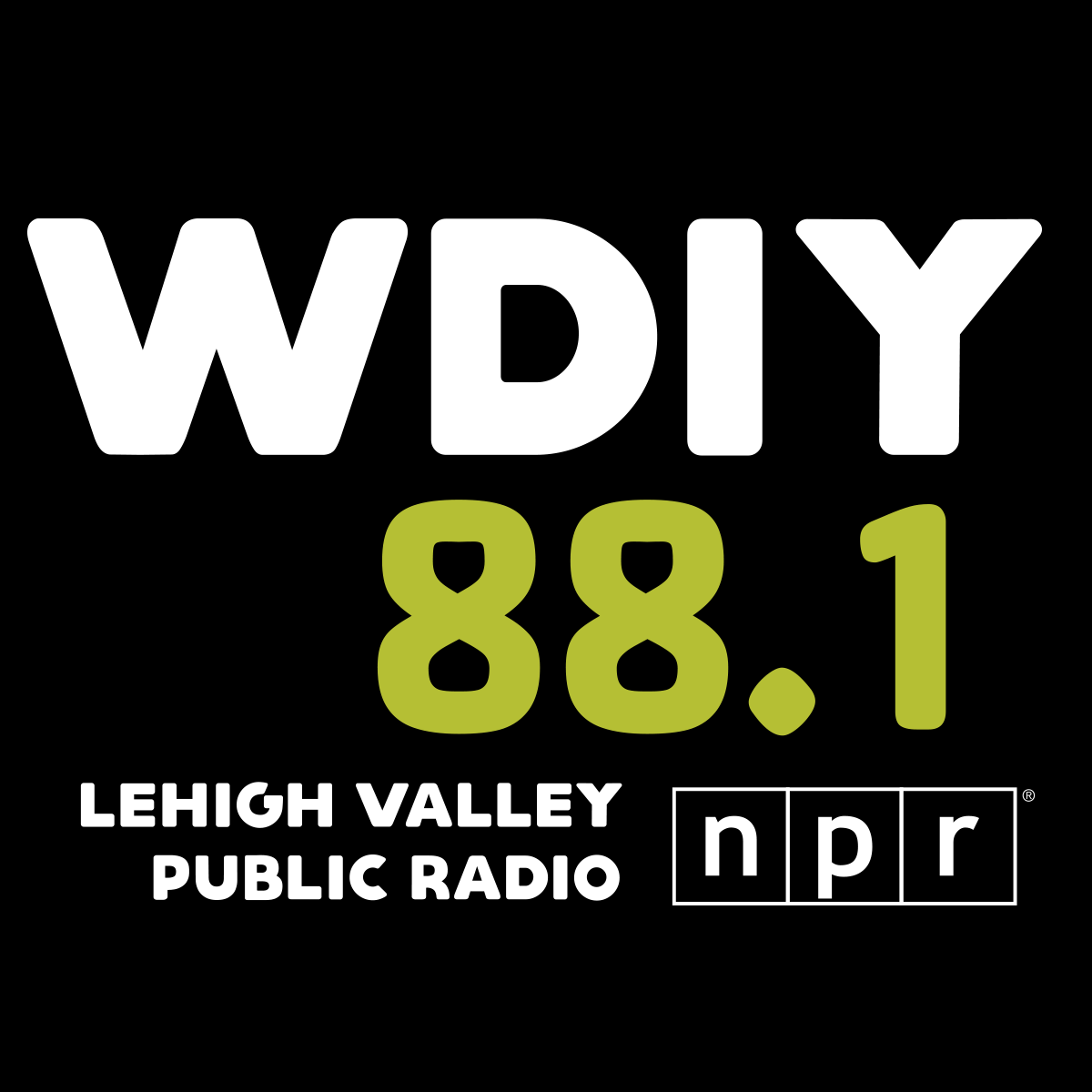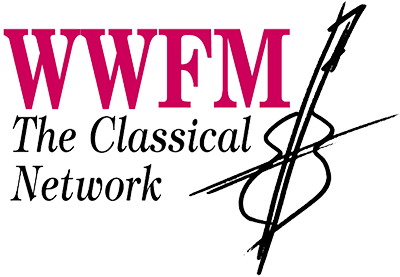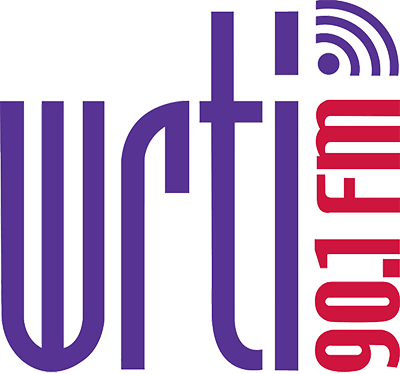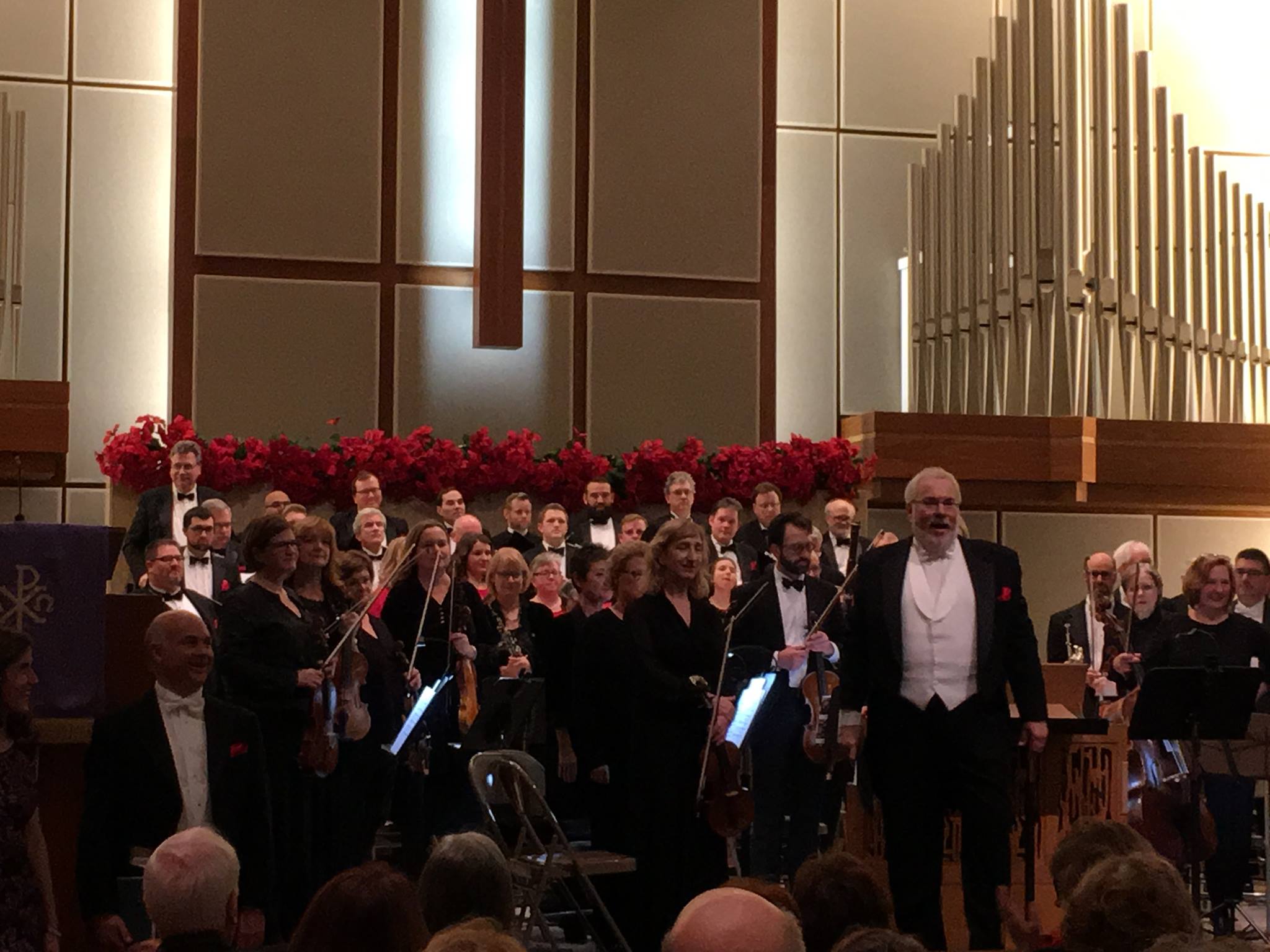
At the Allentown Concert, photo by Linda Ruhf
For some reason, emotions were running high at the end of our performance in Bethlehem, something I, myself, experienced. I can’t speak to reasons why others were so obviously moved by the experience, but I can surely say what I found so powerful, and I realized it at dinner, this evening. The restaurant we were patronizing was playing a sort of pop-ish holiday medley that included a quasi-Latin take on the song, “Silver Bells.” There was synthesized brass and timpani, and it’s the sort of thing that usually demolishes my appetite, and after a few grinchly remarks, my wife encouraged me to cool my jets. Even so, I couldn’t help but think of the contrast to what we experienced at the conclusions of Saturday’s and Sunday’s concerts: “Silent Night,” sung in four part harmony by the audience and Choir, alike, two verses in German bookending a verse in English, with Gerre Hancock’s ravishing descant on the last verse. Simplicity, itself, but also deeply, deeply, authentic, deeply organic, without affectation, voices raised in community. No amplification, no synthesized percussion, no nonsense. In our over-auto-tuned, post-truth culture of so much smoke and so many mirrors, it is refreshing to experience something so utterly powerful for its simplicity. And that was just the ending.
The rest of the concerts seemed, to my ears, to celebrate the use of craft and skill to advance a familiar narrative in ways that seemed impossibly fresh and beguiling. If you asked me what my favorite moment of the concerts was, I’d have to demure. Each succeeding aria, recitative, and chorus seemed to build on the previous, and to favor one over another seems needlessly exclusive. Thus, my favorite moment seemed to stretch well over two hours.
How about some highlights instead? Hearing RJ Kelly and Tony Cecere play the punishingly high horn obbligatos in the opening and closing choruses of the fourth cantata of the Christmas Oratorio with such panache, style, and bravery was utterly thrilling. Ben Butterfield, our excellent tenor soloist, began the recitatives with a sense of compelling storytelling, in a manner that invited listeners to lean forward and pay special heed to what was unfolding. He also acquitted himself fearlessly in his arias, and with some particularly high tessitura recitative singing. This cantata was composed as part of the larger whole oratorio to commemorate the circumcision and naming of Jesus, and our wonderful bass soloist, David Newman, captured the multifaceted nature of Picander’s libretto in his first recitative, in which he repeats the name of Jesus six times. David’s sense of drama and devotion are powerful – his voice commands both attention and admiration (he’s also a deeply-inspiring and hilarious pedagogue – follow this link to one of his masterpieces in the country and western style explaining a particular chord usage in music theory). Then followed the Oratorio’s famous “Echo Aria,” which showcased our radiant soprano soloist, Ellen McAteer, her more than capable “echoer,” Bach Choir member Shannon Aloise, and oboist extraordinaire, Mary Watt. There are perhaps more eloquent ways to put this, but their volleying of the fanfare figurations in this charming aria simply gave me the feels. As frequently is the case, we are often surprised at the talent of members of the Choir who are from time to time given solo opportunities. I knew that Shannon was an excellent singer, but the way she complimented Ellen’s color and delivery was extremely impressive. Mary’s playing was, as always, fantastic. I have been long on the record in admiration of Ellen’s singing. A danger of the more recent style of baroque soprano singing is a sort of wan, skeletal sound in the lower register, for which we will make excuses, because it usually is an indication of a sort of chant du rossignol upper register: extremely agreeable in its sweet and flutey sound. With Ellen, no compromise is necessary. Her voice is powerful, colorful, and full of shimmery overtones from her lowest to highest notes, and her singing here was immensely rewarding. We were also granted the opportunity to hear Laura Atkinson, our wonderful alto soloist, share her plush, enveloping sound in some beautiful recitativo accompagnato. In a way, her assignments in these concerts left us all feeling a little cheated (there were no alto arias in these cantatas from the Oratorio). It’s been since Catherine Robbin, Marietta Simpson, and, dare I say, Janice Taylor (three great titans from the past) were in town that we’ve heard such rich-toned and lavish mezzo sopranoing in these parts.
There was some stunning instrumental soloing, as well. Mary Watt and Nobuo Kitagawa on oboes d’amore, joined by Chuck Holdeman on bassoon, and Charlotte Mattax-Moersch, on continuo organ, created a sonority that honored Bach’s evocation of the instruments of the Middle East in two arias, and Liz Field’s and Claire Bright’s dueling violins in an aria with Ben were riveting (Not least of which because Liz’s music seemed to become unbound and fell to the floor during a page turn, after which Becky Brown, one of our great violinists, bravely dodged Liz’s furious bowing to try to reassemble it of her. This led to a quick rerecording of the B-seciont of the piece for radio broadcast, after which Greg Funfgeld turned to the audience and deadpanned, “We will never speak of this again,” after there was good-natured applause on the part of our gracious audience). There was also some fantastic trumpeting from Larry Wright and his colleagues. Larry, in particular, offered some fierce playing on the fiendishly difficult last movement. Bach sets a festive, major-key version of the Passion Chorale to accompaniment that would give the Second Brandenburg Concerto a run for its money in the challenging-for-trumpet category. Larry pulled it all off, and then some. Likewise, the orchestra, as a whole, sounded marvelous from start to finish. The demands on the instrumentalists are quite varied – from sensitive pastorale to fleet “hoedown” (in the words of our conductor) – and their playing was an inspired and solid undergirding for the entire proceeding. Kudos, too, to our fearless leader, who managed the whole thing with remarkable aplomb, infectious energy, and good humor.
I usually refrain from speaking about the Choir in these wrap-ups, because it’s perhaps a little gauche to comment on the facets of a performance in which I participated directly. I will say that the tenors really seemed to have had their V8 before both concerts, and things on the choral front seemed to go really well. If you were at either concert, or missed it and would like to hear, WWFM recorded the Sunday afternoon performance for broadcast on Christmas Eve, at 8 pm. If you’re available, I highly recommend a listen – these really were spectacular concerts!
















